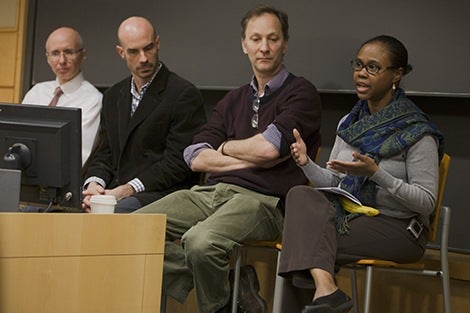April 27, 2017—How can scientists turn their research into action? Four faculty members from Harvard T.H. Chan School of Public Health shared advice from their careers during a panel discussion on March 20, 2017. The event was organized by students Anna Young, SM ’18, Annelise Mesler, SD ’20, and Erika Eitland, SD ’20, and focused on the challenges researchers often face in translating scientific results for the general public.
Marc Weisskopf, associate professor of environmental and occupational epidemiology, said that before research can have an impact, people must understand the scientific process—and that begins with effective communication.
“Science isn’t about figuring out the absolute truth; we’re always evolving,” Weisskopf said, addressing the uncertainty that can often surround recommendations related to health. “We’re never going to be 100% [certain], but we need to make our best judgments based on the evidence we have.”
Joseph Allen, assistant professor of exposure assessment science and director of the Healthy Buildings program, has seen the importance of communication firsthand. He recalled meeting with a CEO in the indoor air purification industry who was unaware of the negative effects of particulate air pollution—an area where there is large amount of evidence. In response, Allen and his team have created quick guides to air pollution that have been well-received by business leaders. “We’re not doing a good enough job of explaining what matters and why it matters,” Allen told the audience. He said that researchers can’t simply hope that good science will get read and acted upon. Instead, Allen urged those in the public health field to step outside of academia and speak directly to the people who work in areas they’re trying to influence.
Can scientists be advocates?
Actually turning research into action can be fraught with ethical tension for scientists, because in order to be respected their work must be viewed as unbiased. That’s why researchers are often faced with an ethical “double bind,” when it comes to advocacy according to Aaron Bernstein, associate director of the Center for Health and the Global Environment. On one hand, scientists are bound to their profession and the scientific method, but at the same time researchers have a duty to speak out if they know about an issue that’s causing harm—such as lead poisoning or climate change, he said.
There are also ways that researchers can push for change without being vocal, or in the public eye, said Tamarra James-Todd, Mark and Catherine Winkler Assistant Professor of Environmental Reproductive and Perinatal Epidemiology. That includes adopting new research approaches, for example, ones that are community-based. James-Todd says this approach requires that scientists speak to the people affected by the problems they’re trying to document. For example, a researcher studying health disparities among people in low-income housing should speak with the residents—and let their input help to guide the research.
Photo: Sarah Sholes
